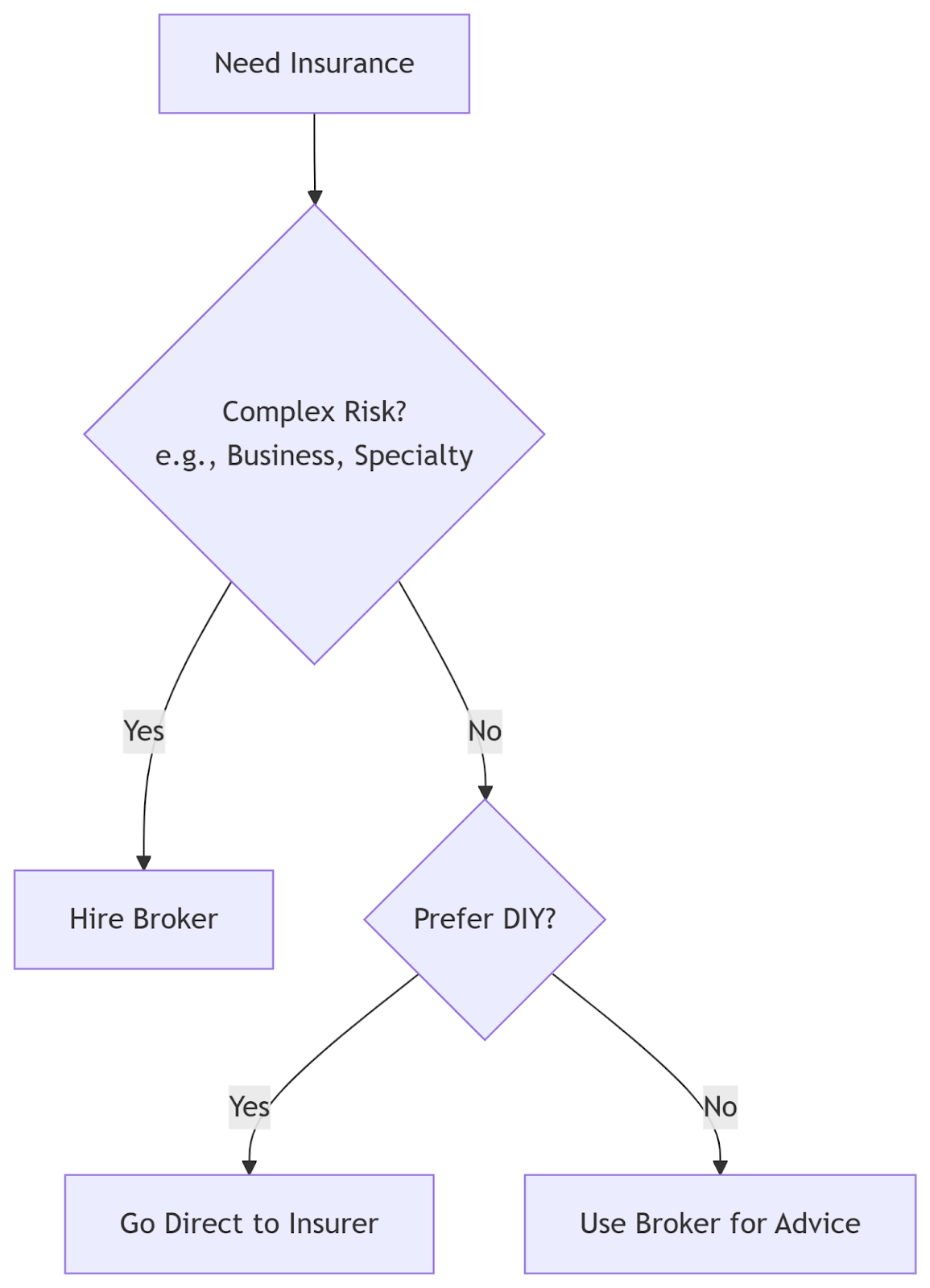
Insurance Broker vs. Insurance Company: What’s the Difference?
The losses recorded by businesses due to the errors of insurance partners were not less than 37 billion due to coverage shortfall. When 68 percent of policyholders do not know who exactly is on their side, it seems that insurance becomes a gamble where everyone will lose. Insurance Broker vs. Insurance Company: What’s the Difference?
This guide breaks down who gets paid how, when to use a broker versus going directly, and three sneaky conflicts of interest to avoid, ensuring you get coverage that protects without costly mistakes.
Insurance Companies Explained: The "Manufacturers"
Role
Insurance companies create and underwrite policies, assuming the financial risk of claims.
How They Work
- Underwrites Policies
- Sells Direct or via Captive Agents
- Handles Claims
- Sets Premiums & Exclusions
- Promotes Own Products
- Adjusters Serve Company
Pros
- Direct Control:
Streamlined policy issuance and claims processing (sometimes). - Brand Consistency:
Familiar names with established reputations. - Simplified Process:
One-stop shop for standard policies like auto or home.
Cons
- Limited Options:
Only sell their own policies, restricting choice. - Sales-Driven:
Captive agents prioritize company products over your needs.
Insurance Brokers Demystified: The "Matchmakers"
Role
Brokers are independent advisors who shop multiple insurers to find the best coverage for you.
How They Work
- Shops 100+ Insurers
- Negotiates Terms
- Advocates During Claims
- Compare Rates & Coverage
- Customizes Policies
- Fights for Client Payout
Types
- Retail Brokers:
Serve individuals and small businesses for standard policies like what's tenant insurance. - Wholesale Brokers:
Handle complex risks.
Pros
- Wide Access:
Compare policies from 10–100+ carriers for optimal fit. - Negotiation Power:
Obtain more advantageous conditions or discounts on knowledge. - Claims Advocacy:
Be your advocate and demand equitable settlements.
Cons
- Potential Fees:
Some brokers charge fees (though most are commission-based). - Less Brand Recognition:
Independent brokers lack the name power of big insurers.
Key Differences
Factor
Insurance Company
Insurance Broker
Loyalty
To shareholders
To YOU (fiduciary duty in 40 states)
Product Access
Only their policies
10–100+ carriers
Pricing Power
Fixed rates
Can negotiate discounts
Claims Help
Adjusters work for insurer
Broker advocates for you
Payment Model
Premiums
Commissions (from insurers) or fees
When to Choose Which
Choose based on your needs:

Ideal Broker Scenarios
- Commercial/Business Policies:
Brokers navigate complex risks like general liability or cyber insurance. - High-Risk Homes:
Properties in wildfire or flood zones benefit from brokers’ multi-carrier access. - Unique Assets:
Art, yachts, or niche risks require specialized coverage brokers can source.
Ideal Direct Scenarios
- Simple Auto/Home Policies:
Standard policies from insurers like Summit Insurance Kelowna are straightforward. - Brand-Loyal Customers:
If you trust a specific insurer, direct buying simplifies the process. - Price-Sensitive Shoppers:
Direct insurers may offer lower premiums for basic coverage.
Hidden Conflicts & How to Avoid Them
Broker Risks
- Steering:
Some brokers push insurers paying higher commissions (5–15% of premiums).- Solution:
Ask, “What’s your commission on this policy?” Transparent brokers, like those at Insurance Broker Calgary, will disclose this.
- Solution:
Insurer Risks
- Policy Gaps:
Exclusions buried in fine print leave you exposed (e.g., no flood coverage in a home policy).- Solution:
Demand a coverage gap analysis to identify missing protections.
- Solution:
Regulatory Safeguards
Brokers
- Licensing:
Regulated by state Departments of Insurance (DOI), ensuring accountability. - Fiduciary Duty:
In 40 states, brokers are legally obligated to prioritize your interests.
Insurers
- Rate Approvals:
States require insurers to justify premium rates, protecting consumers. - Guaranty Funds:
State funds cover claims if an insurer goes bankrupt, safeguarding policyholders.
Verify licenses via your state’s DOI website for peace of mind.
Key Takeaways
Match your needs to the right partner:
- Use Brokers for:
Complex risks, claims advocacy, and access to multiple carriers for tailored solutions like Technology Insurance! - Use Insurers for:
Simple policies, DIY control, and brand trust. - Always Verify:
Check licenses on your state’s DOI website and ask, “Who benefits from this sale?”
Final Thoughts
Insurance Broker vs. Insurance Company: What’s the Difference? - The decision between the insurance broker and the insurance company can spell the difference between effective coverage and gaps that are expensive to fill. It is best to begin by checking licenses, asking to conduct a coverage gap analysis, and selecting a trusted partner like Summit Insurance that fits your needs. Do not allow confusion to cost you, but rather make a choice today.



